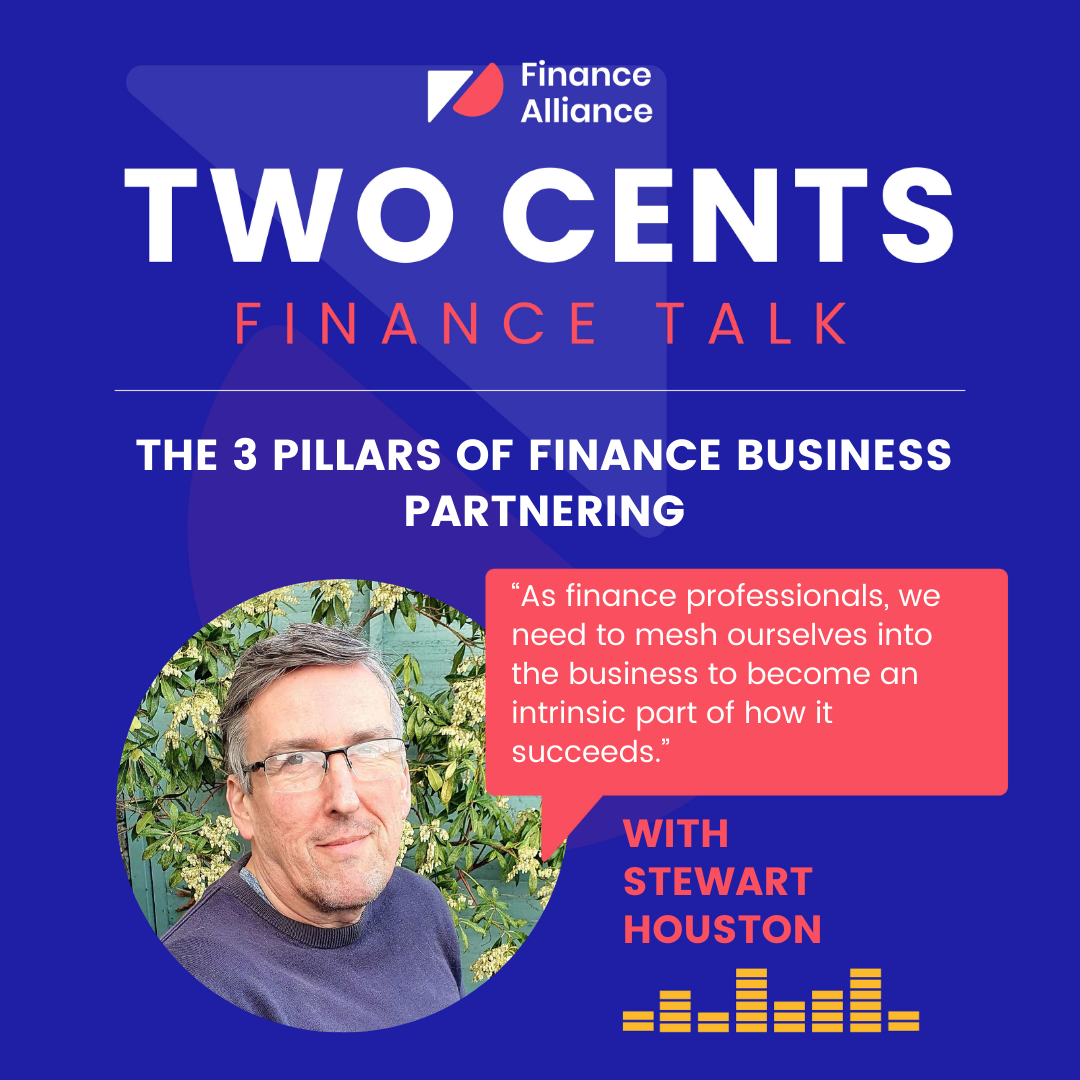Want to know how to become a successful finance partner?
The role of the finance function has changed massively over recent years. Rather than generating reports all day, finance pros must step into a partnership role and work closely with other functions of the business.
But how can you do that effectively?
In this episode of the Two Cents: Finance Talk podcast, Stewart Houston, Exec. Director of Business Operations Finance at ICON plc., reveals the 3 pillars of a successful finance partner.
You can listen to the full episode below:
Or, if you prefer, keep reading to learn more about what it takes to become a strategic finance partner.
Stewart covers topics such as:
- Why finance business partnership is so important
- How finance professionals can make a greater contribution to an organization
- The three main pillars of business partnering
- How to avoid common mistakes when transitioning to an effective finance business partner role
- How to keep your advice relevant to the changing needs of the business
- How to implement business partnering in your workplace
- Core principles of financial leadership
Why should you care about becoming an effective finance partner?
If you want to make real time impact and solidify your place within a business, you’ve got to be more than just a ‘number cruncher.’
Moving into a business partnering role is a topic that gets a lot of airtime on places like LinkedIn. Finance professionals talk about it a lot and it’s become somewhat of a ‘buzz’ term in the industry.
Yet, many of the people talking about finance business partnerships don’t always get to the crux of it. There's always repetition on what people should be doing, but very little on the why.
Stewart shared exactly why a finance business partnership is so important…
“For finance people, business partnering is about breaking out of the accounting stereotype and meshing ourselves into the business (and business strategy) to become an intrinsic part of how they succeed. If we don't do that, we die on the vine and become nothing more than accountants.”
“Business partnering is the future of finance. However, it’s not new either. I've been practicing it for 10 years, and probably longer than that without realizing what the term is. It’s a natural place for us finance folks to go if we want to do more than just accounting and the mundane processes.”
“Equally, we can expand on it some of the things going on in the business world with sustainability and big data for instance, which finance can add a lot of value. Beyond the self-preservation piece, we can add something to the business because there are things tangibly in our power to improve on.” – Stewart Houston
Businesses rely on the finance team to act as both the interface and translator between finance and operations. Finance teams need to get involved where possible and act as the conduits between various business functions.
“Sometimes, other business functions aren’t as streamlined as you'd expect them to be, and we can step in to become the glue between functions.”
“We don't have to just be the to and fro between the P&L and the operations, P&L, and facilities - we can spread in a more matrix type relationship than just the to and fro to your core financial elements.” - Stewart Houston

How finance teams can make a greater contribution to an organization
Finance leaders (including CFOs) tend to be comfortable with the content of the P&L. So if you want to start making a difference, Stewart recommends that you start by looking at things in the P&L and then work your way out from there.
Making a greater contribution to your organization and helping with decision-making isn’t just about looking at variances between periods but looking at where the pain points in the organization are – and coming up with solutions to fix them.
“Whilst we recognize something's not working, we look to fix it and it should be a dynamic environment we're dealing with. What we're looking at today may not be what we're looking at tomorrow.
“So, have your eyes and ears open to the landscape to see what's going on and try and tap into where you can help convey what’s going on to the various groups.” - Stewart Houston
Stewart also advises that you work on developing sound analytical skills and communication skills. He talked about introducing metrics where there are no metrics.
If you’re in finance, it’s safe to assume that you are a data-led person. Use this to your advantage by introducing metrics, preferrable a focused operational metric where possible. Or, something with a dollar symbol.
When a metric has a dollar (or pound or euro etc.) symbol next to it, it tends to get more attention. Therefore, if you said, “if we don't do this or if this series of events happen, it will cost us $10 million over the next year” – that’ll get a bigger piece of exposure and attention than if you just said the first piece.
“Look at the getting involved in the areas of greatest impact - not the areas you're most interested in.” - Stewart Houston
3 main pillars of finance business partnering
Stewart shared the three main building blocks to effective finance business partnering.
Watch the video below to hear Stewart explain each pillar in more detail:
1. The first pillar is basic and it’s almost at the transactional level, but not quite. You can have some discussion about what’s going on at the transaction level, such as the outcome of the transaction, and provide necessary financial information.
2. The second step is to collaborate with the business unit on its specific issues. For example, they have a problem where they don't understand why they have erosion on margin in a particular product area. Well, you can pull data and help them understand and construe it.
3. The third piece is the Holy Grail of business partnering for finance, and it’s where we're problem-solving and driving the agenda.
“That's the hardest piece to come across because you're sometimes going to deal with problems in their area that they haven't identified yet so you have to be diplomatic with it. If you're not diplomatic, your shutters will come down and you won't get anywhere.” - Stewart Houston

How to avoid common mistakes when transitioning to a business partnership role
The first thing you need to do to become a successful finance partner is to see where your existing relationship with the business (and certain roles within it) lies.
This is a vital step because you can’t look at what you can do to improve until you have established a relationship. If you are currently working with them, establish the platform you want to work with them from.
A quick Google search on this topic will generate articles, videos, and podcasts covering topics on how to become a finance partner. Some of it is gold but a lot of it is often misinformation or it lacks substantial advice.
Here’s what Stewart had to say about some of the existing advice out there on the business partnership:
“One of my main objections to the online advice that's out there is that there is this innate subservience from finance to the business unit. We're looking to help them, and we're stuck.”
“But the more you allow yourself to stay stuck, the more it’s going to form what the relationship looks like. That becomes what they expect of you and it becomes more difficult to break out from it.”
“Try and not stay too long at that level and be subservient to what they want to do. Work with them on what's important to them and on what's important to you. That's how it works best.” - Stewart Houston
When working with other functions in the business, remember that they don’t always see the big picture that you’re trying to work towards. Everyone’s focused on their areas of the business.
So, how can you intertwine effectively with various areas of the business – without the whole thing falling apart?
Here are Stewart’s top tips to improve how you work with other people (outside the finance team):
- Take a step back and try not to tell them how to do their job. Instead, talk to them about the implication of how they're currently working with other teams and how they could perhaps work better.
- Don't fast forward to a conclusion without bringing other people in. Take others on the journey with you.
- Once you recognize something that may be problematic and have data evidence to back it up, bring that data to the people you're trying to partner with. And, bring them in as early as possible.
- Whatever you set up, make sure it’s sustainable and maintainable.
“You need the partnership to be as harmonious as possible. So don't just throw a conclusive piece of evidence in front of someone and expect them to work to conform to it.” - Stewart Houston
How to know when you’re doing it right
Want to know how to measure the effectiveness of a finance partner?
Start by asking yourself these three questions:
- Am I working with the business?
- Do I have regular touch points with business partners in business units? Or, are they going back to my three pillars and either coming to me for one or two and then disappearing again?
- Is there an ongoing flow of building on the knowledge together, making improvements together, and maintaining what we've agreed previously?
Take time to consider whether there’s an existing building block for the relationship because if there isn't, something is missing with the partnership. You're just being a service function providing information for them as and when they need it. But if that's it, it won’t work.
Once you’ve figured out the involvement, make sure to include measurable goals with what you've agreed and across the timeline.
“The bigger the initiative, the longer it tends to last. So, get involved in longer initiatives because it will guarantee that you’ll have regular touchpoints with the business unit. Through the various interactions with them, other things will come into play as well.”
“Consistent and active involvement with them is essential and if you're not getting there, reassess your approach. Don't take no for an answer if you know saying no is not the right answer.” - Stewart Houston

How to keep your advice relevant to the changing needs of the business
Organizations are relying on finance more heavily to help them make strategic and profitable business decisions. This means that you’ve always got to be on top of your game and ensure your advice is relevant to the changing needs of the business.
The problem is making sure you understand what those changing needs are. You may well have to force your way in. Whatever the case, you should know the general runnings of the business and any new waves going on in the industry.
Stewart advises that you avoid setting up a suite of reports. There’ll be a need for reporting and you‘ll likely be the person providing that reporting - but don't just produce project report X forevermore.
“You don't want to get to that point because it’s just a waste of everyone's time and resources. It also probably means the report either wasn't useful in the first instance or the time has moved on and this report hasn't moved with it.” - Stewart Houston
Don't let these things stagnate. During those meetings with the business units, learning what's going on in the model and the industry landscape will keep your reporting fresh.

How to implement business partnering in your workplace
Assess the work environment you're in. Assess the current relationship between yourself and the business units and the people you want to partner with, and then drive it on from there. If you already have the relationship because you’re doing a lot of transactional type of engagement, then you have one foot in the door. However, if you don't, you’ll have to establish yourself first.
Here are Stewart’s three pieces of advice to implement business partnership in your workplace:
1. Celebrate joint wins.
This is why goals are important because you can't celebrate what you haven't achieved. From the outset, set goals. When you achieve them always go back to your manager (as well as their manager) to let them know about your joint win.
2. Assess your capabilities.
It would help if you had an enthusiasm for it. Be resilient and thick-skinned because you’re not necessarily going to be received particularly well when you're shining a light on someone's performance and saying it has to change. That's not for everyone.
3. Don't blindly follow advice from anyone.
Shape how you forge those relationships and what needs to be done. There's no recipe book about how you can become a successful business partner. It’s something you need to forge yourself. You can cherry-pick pieces of advice, but bear in mind it’s your own journey you have to follow.

Core principles of financial leadership
Leadership is a massive part of transitioning to a finance partner.
But the question remains... do you have what it takes to be a leader and a finance partner?
Here are Stewart's three core principles of financial leadership:
1. Guiding without micromanaging
“I hate to micromanage, but you have to recognize that sometimes you have to step in if something's not working.”
“However, I prefer people to work their own path without too much interference because if you keep stepping in they become a ‘pseudo you’, which is not what we want. We want everyone to be individuals and have their own input.”
2. Supporting your team’s success
“Another one of my core principles is having anyone who joins my team succeed in some respect.”
“If they leave the team, I want them to be in a better position than they came in, in terms of knowledge and skills. If that hasn't happened, then I've done something wrong. I like to see people growing in themselves and within themselves.”
3. Integrity
“Integrity, acting consistently and equitably is essential. I always try to maintain that, and I think I succeeded.”
“For example, if you set an expectation that you're going to have a certain set of data by the end of Thursday and Thursday comes and goes and you still haven't got it, it drives people crazy because invariably, it's important stuff and they've got plans downstream for it.”
“If you give people a reason as to why it won’t be done on Thursday then they can plan accordingly. I'm increasingly amazed by the number of people who don't do that because it's so simple.”
4. Allow people to have some level of failure
“I’m not talking about people repeating the same mistakes, but about a mistake, people will learn from. Allow people to explore and be creative. It's not always going to work and it might fail, but it's not the failure itself is how you deal with the failure.”
“Once something's gone wrong, I don't spend time castigating everyone but I think about how can we make this better?”
About the guest

Stewart is the Exec. Director of Business Operations Finance at ICON plc. He’s CIMA qualified with 20 years post qualified experience. His main focus is primarily on Financial Planning and Business Partnering.
In his formative years, Stewart worked in the IT\Telco field. But now, he works with ICON plc (formerly PRA Health sciences acquired by ICON plc). He works with a variety of operations teams and Corporate Service functions. Stewart is also 2/3 of the way through an MBA with Henley Business School, which deserves a round of applause.






